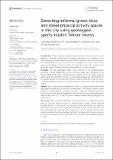Detecting informal green, blue, and street physical activity spaces in the city using geotagged sports-related Twitter tweets
Abstract
Introduction Finland's natural physical environment and climate support a wide variety of informal outdoor sports, thereby motivating the population to do physical exercise in scenic environments. The vast majority of Finns enjoys outdoor recreational activities, and could thus be encouraged to post accounts of their year-round activities on social media. Our aim was to find out in what kind of areas and spaces, spatially, users are tweeting about sporting activities. Methods We use geotagged Twitter tweets filtering for 16 sporting activity keywords in both English and Finnish. The case study was conducted in the Helsinki Metropolitan Area, Finland, with an emphasis on cross-country skiing as a sports activity when there is snow. In a secondary analysis we concentrated on the sports people were practicing in these locations when there was no snow. The location spaces are split in to three land cover types: green, blue, and street spaces. Results We found that approximately half of the 150 skiing-related tweets were geotagged in green spaces, and half in street spaces. This finding related to street space was attributable to a spatial scale error: when we checked the results manually we noticed that they referenced the sporting location in the green space. Hence, then over 90% of the 745 non-ski-related tweets were geotagged in a street space. Discussion We conclude that Twitter is a beneficial tool for detecting spaces used for informal physical activity. A shortcoming in current Finnish national sporting policies is that spaces for informal physical activity are not explicitly mentioned- we use the term informal with reference both to the space and to the sporting activity, whereby public spaces are used for physical activity. This new knowledge of sporting locations will help city planners and sports planners to improve informal sports facilities, which in turn will promote healthy exercise in cities.
Citation
van der Lijn , C , Ehnström , E , Koivisto , S & Muukkonen , P 2023 , ' Detecting informal green, blue, and street physical activity spaces in the city using geotagged sports-related Twitter tweets ' , Frontiers in Sociology , vol. 8 , 1125343 . https://doi.org/10.3389/fsoc.2023.1125343
Publication
Frontiers in Sociology
Status
Peer reviewed
ISSN
2297-7775Type
Journal article
Description
Funding: This paper was written within the research project entitled Equality in suburban physical activity environments, YLLI (in Finnish: Yhdenvertainen liikunnallinen lähiö, YLLI) funded by the Suburban Programme 2020–2022 (in Finnish: Lähiöohjelma 2020–2022) decision number VN/10837/2020. The Suburban Programme 2020–2022 is coordinated by the Ministry of the Environment, Finland, together with the Ministry of Social Affairs and Health, the Ministry of Education and Culture, the Ministry of Economic Affairs and Employment, the Ministry of the Interior, the Ministry of Justice, and the Housing Finance and Development Centre of Finland (ARA).Collections
Items in the St Andrews Research Repository are protected by copyright, with all rights reserved, unless otherwise indicated.

